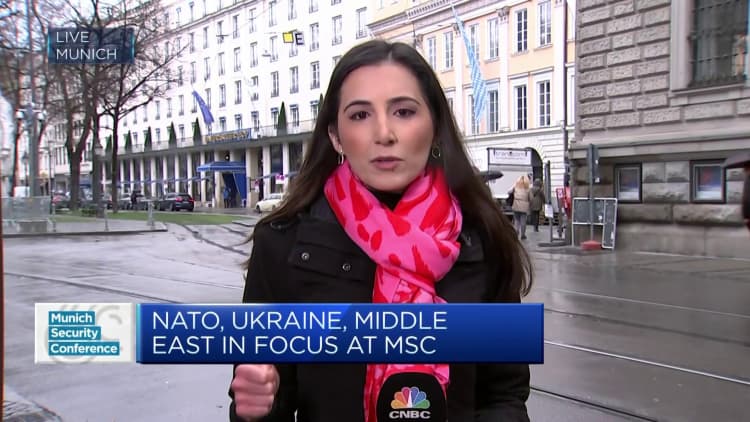Russia was ridiculed at the start of the war. Two years on, it has reasons to be confident
A Ukrainian soldier in a shelter at his fighting position in the direction of Bakhmut, Donetsk Oblast, Ukraine, 20 February 2024.
Anadolu | Anadolu | Getty Images
When Russia invaded Ukraine two years ago, the stout resistance mounted by the country’s armed forces and overwhelming Western support for Kyiv — along with some obvious military overreach by Moscow — raised hopes that Ukraine’s outnumbered and outgunned army could beat back the invading forces.
Fast forward two years and hopes of a Ukrainian victory look diminished and increasingly hollow, as do Western pledges to support Ukraine “for as long as it takes.”
As it stands, billions of dollars worth of American military aid remains unapproved with further struggles likely ahead, as war and funding fatigue grow in the run up to the U.S. presidential election — a vote that could see an administration installed that’s less sympathetic to Ukraine’s war needs.
On the battlefield in Ukraine, meanwhile, the front lines have been broadly static for months, save for recent gains that have been made by Russian forces in the east of the country.
Kyiv continues to insist it is not being given the proper tools to fight Russia as effectively as it could do, and there have been reports of morale ebbing among front line forces who are facing ammunition and personnel shortages. Internal political frictions and the replacement of popular military chief General Valerii Zaluzhnyi has also fueled concerns over military strategy going forward.
“This year is the most difficult year for Ukraine that there’s been so far in this war, in part because of the disconcertion over Zaluzhnyi being replaced and the retreat from Avdiivka, but mostly, because of the massive uncertainty over the level of Western assistance and aid,” James Nixey, the head of the Russia and Eurasia program at think tank Chatham House, said Monday.
“I think for Ukraine, there’s really quite minimal difference between a president who can’t deliver lethal aid and a president who won’t deliver lethal aid. And for Ukrainians that’s effectively one and the same thing, and it’s an existential question. So Putin is not really betting everything he can on [Republican presidential hopeful Donald] Trump because he believes he can win whatever the outcome of the U.S. election in November,” Nixey said.
“In other words, Putin senses weakness, as he so often has done in the past, and he is absolutely right. Whether his confidence is justified remains to be seen, but he at least more or less knows what he has at his disposal this summer, or this time next year or even beyond, and Ukraine simply can’t say the same thing.”
Russia’s President Vladimir Putin listens while then-U.S. President Donald Trump speaks during a press conference in Helsinki, Finland, in 2019.
Brendan Smialowski | AFP | Getty Images
While the West will likely be dominated this year by domestic political infighting ahead of elections in the U.S., U.K. and EU Parliament, “Russia faces none of these constraints” Nixey said, noting that Moscow was “prepared to do a great deal of damage to itself in pursuit of victory.”
Russia certainly appears ebullient as the war enters its third year, its confidence bolstered by recent advances — the capture of Avdiivka last week being the most significant win in nine months, followed by smaller territorial gains this week — and the clearing of political opponents at home ahead of a presidential election next month.
Needless to say, Russian President Vladimir Putin is expected to win the vote easily, particularly given that most critics are in self-imposed exile, banned from political participation, imprisoned or dead, the most recent being Alexei Navalny who died in a remote Arctic penal colony last week.
Russian President Vladimir Putin smiles while visiting an aviation plant on February 21, 2024, in Kazan, Russia.
Contributor | Getty Images News | Getty Images
While the fortunes of war are unpredictable, political analysts note that Russia holds a lot of the cards as to what happens in the war, as does the West.
Kurt Volker, a former U.S. ambassador to NATO and special envoy to Ukraine, told CNBC that he’d found there was “a lot of concern about the West and the U.S., in particular” during his conversations with regional officials and military commanders in Ukraine.
“Will we provide the levels of military and economic support to Ukraine that we have done, and that they continue to need? Because without that, they are worried that Russia has more resources, will continue to press on the front, will continue to buy drones and missiles and fire them at Ukrainian cities, and so this war goes on as is — not necessarily with huge losses but as is — and they don’t get their territory back,” he said Thursday.
Russia counts gains
In the early months of the war in Ukraine in spring 2022, Russia’s military strategy and tactics were criticized and often ridiculed, particularly when Russian forces had to beat a hasty retreat on the northern front after a failed attempt to reach the capital Kyiv.
Then, Russian forces were widely viewed as ill-equipped, poorly trained and disorganized but defense analysts noted Russia’s military adapted and that a more structured, coordinated and reactive armed force emerged last year.
No one is laughing about Russian military tactics now, with its forces either entrenched in heavily-fortified defensive positions that thwarted a Ukrainian counteroffensive last summer, or are launching offensive operations, predominantly in east Ukraine.
The military was emboldened by the capture of Avdiivka in Donetsk after months of intense fighting; Putin called it an “absolute success,” adding that it “needs to be built on.”
Analysts say the victory has come at an opportune moment for Putin ahead of the election on March 15-17, and that Russia was looking “to generate panic in the Ukrainian information space and weaken Ukrainian morale,” as the Institute for the Study of War noted in analysis this week.
That as many as 47,000 Russian troops, according to Ukrainian estimates, may have perished in the long battle for Avdiivka has not been confirmed or denied by Russia. While accurate and up to date figures are impossible to come by, the total number of troops killed and injured in the war, on both sides, is around 500,000, U.S. officials said last August.

Analysts note that what matters to Moscow is what the Avdiivka victory looks like to the Russian public ahead of the election — and what signal it sends to the West; namely, that Russia is in the war for the long haul and is set on achieving its goals in Ukraine, whatever the price.
Manpower
At it stands, Russia occupies almost a fifth of Ukraine’s territory and has shown it can mobilize hundreds of thousands of men to fight at will, highlighting another advantage it has over Ukraine, which has been sheepish over the need to mobilize more civilians to fight.
“I think that as long as Putin is in power, the war continues,” Volker noted. “Because he doesn’t care how many Russians he kills, he will just keep throwing wave after wave after wave [of personnel] at the frontlines and kill tens and tens and tens of thousands. And he doesn’t care. So as long as Putin is there, this war is going to continue,” he said. CNBC has contacted the Kremlin for a response to the comments and is awaiting a reply.
Ukraine’s army has called for 500,000 extra personnel to be mobilized but President Volodymyr Zelenskyy has been wary, describing it is a “sensitive” issue. Mobilization was a “hot potato tossed between the government and the military” that can no longer be avoided, according to David Kirichenko, an analyst at the Center for European Policy Analysis.
“What is clear is that Ukraine has no choice but to mobilize more people. The men and women who have been fighting in intensive combat for 23 months are suffering serious fatigue and heavy losses,” he noted.
“The dispute over mobilization is happening at a time when most authorized U.S. military aid is close to exhausted and Congress has yet to pass a new aid package.”
“Ukraine has had to pause many of its military operations due to weapons shortages and the situation at the front looks tough. For now, at least, fighting is largely attritional, which favors Russia. There is however no sign that Ukraine will end its resistance,” Kirichenko said.
Members of the ‘Paragon’ military division, part of the ‘Tymur’ military intelligence unit of the Armed Forces of Ukraine, prepare rifles during shooting exercises in an unspecified location in Ukraine, on Monday, Jan. 29, 2024.
Bloomberg | Bloomberg | Getty Images
That sentiment is echoed by Ukraine’s leadership with Zelenskyy repeatedly saying Ukraine will fight to win back every last inch of its territory, including Crimea which was annexed in 2014.
For now, there are little chances of a political settlement to the war, analysts say, with neither side at a point on the battlefield where they’d feel like they had the upper hand in any peace talks.
Despite the disadvantageous conditions that Ukraine is fighting under, and political uncertainty this year, Kyiv is certainly nowhere near giving up. Asked what happens if international military aid for Ukraine dries up, Volker said Ukraine would “go into guerrilla mode.”
“They would go underground, there would be a resistance. It would be very different from the organized defense that we see today, but they will keep fighting.”
Source – Middle east monitor




